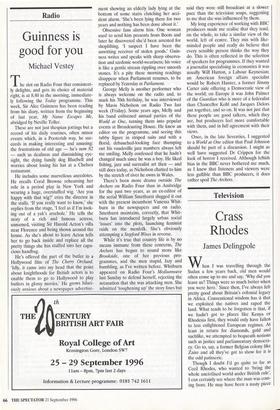Radio
Guinness is good for you
Michael Vestey The slot on Radio Four that consistent- ly delights, and gets its choice of material right, is at 8.40 in the morning, immediate- ly following the Today programme. This week, Sir Alec Guinness has been reading from his diary, written from the beginning of last year, My Name Escapes Me, abridged by Neville Teller.
These are not just thespian jottings but a record of his daily routines, often minor events which, in a Pooterish way, he suc- ceeds in making interesting and amusing: the frustrations of old age — he's now 82 — such as deafness and diminishing eye- sight, the dying family dog Bluebell and worries about losing his hat at a Chelsea restaurant.
He includes some marvellous anecdotes. He recalls Coral Browne rehearsing her role in a period play in New York and wearing a huge, overstuffed wig. 'Are you happy with that wig?' cries the director in the stalls. 'If you really want to know,' she replies from the stage, 'I feel as if I'm look- ing out of a yak's arsehole.' He tells the story of a rich and famous actress, unnamed, visiting Sir Harold Acton's villa near Florence and being shown around the house. As she's about to leave Acton tells her to go back inside and replace all the pretty things she has stuffed into her capa- cious handbag.
He's offered the part of the butler in a Hollywood film of The Cherry Orchard. 'Idly, it came into my head that the point about knighthoods for British actors is to enable them to go to Hollywood to play butlers in glossy movies.' He grows hilari- ously anxiou, about a newspaper advertise-
ment showing an elderly lady lying at the bottom of some stairs clutching her acci- dent alarm. 'She's been lying there for two years and nothing has been done about it.'
Obsessive fans alarm him. One woman used to send him presents from Boots and later he discovered she'd been arrested for shoplifting. 'I suspect I have been the unwitting receiver of stolen goods.' Guin- ness writes and speaks with sharp observa- tion and sardonic world-weariness; his voice is like a gentle stream rippling over smooth stones. It's a pity these morning readings disappear when Parliament resumes, to be replaced by Yesterday in Parliament.
George Melly is another performer who is always welcome on the radio and, to mark his 70th birthday, he was interviewed by Mavis Nicholson on Radio Two last week (Friday). Some years ago, Melly and his band enlivened annual parties of the World at One, turning them into popular events at Broadcasting House. He knew an editor on the programme, and seeing this tubby figure in striped suits and with a florid, debauched-looking face thumping out his vaudeville jazz numbers always left me smiling. Melly confessed that he hadn't changed much since he was a boy. He liked fishing, jazz and surrealist art then — and still does today, as Nicholson chatted to him by the stretch of river he owns in Wales.
There's been more drama outside The Archers on Radio Four than in Ambridge for the past two years, as an ex-editor of the serial William Smethurst slugged it out with the present incumbent Vanessa Whit- burn in the newspapers and on radio. Smethurst maintains, correctly, that Whit- burn has introduced largely urban social 'issues' into the plots, launching feminist raids on the menfolk. She's obviously attempting a Stepford Wives in reverse.
While it's true that country life is by no means immune from these concerns, The Archers has begun to sound more like Brookside, one of her previous pro- grammes, and the men stupid, lazy and bumbling, as I've written before. Whitburn appeared on Radio Four's Mediumwave last Sunday to defend herself, rejecting the accusation that she was attacking men. She admitted 'toughening up' the story lines bu
said they were still broadcast at a slower pace than the television soaps, suggesting to me that she was influenced by them.
My long experience of working with BBC producers made me realise that they tend, on the whole, to take a similar view of the world, left of centre. They mix with like- minded people and really do believe that every sensible person thinks the way they do. This is often reflected in the selection of speakers for programmes. If they wanted a journalist specialising in economics it was usually Will Hutton, a Labour Keynesian; an American foreign affairs specialist would be Robert Hunter, a former Jimmy Carter aide offering a Democratic view of the world; on Europe it was John Palmer of the Guardian who is more of a federalist than Chancellor Kohl and Jacques Delors put together, and so on. It was not just that these people are good talkers, which they are, but producers feel more comfortable with them, and in full agreement with their views.
Once, in the late Seventies, I suggested to a World at One editor that Paul Johnson should be part of a discussion. I might as well have suggested Dr Crippen for the look of horror I received. Although leftish bias in the BBC never bothered me much, as I knew that listeners and viewers were less gullible than BBC producers, it does rather spoil The Archers.


















































































 Previous page
Previous page